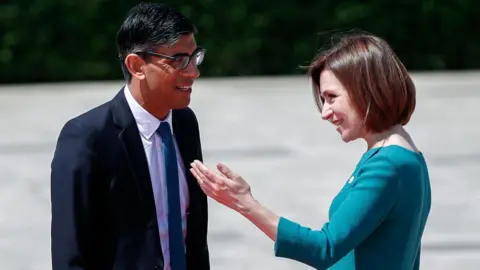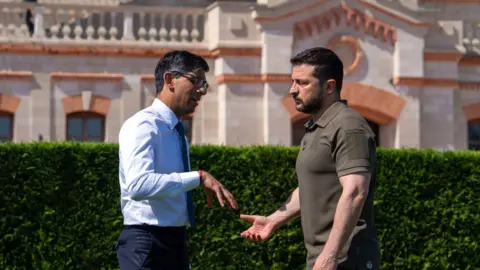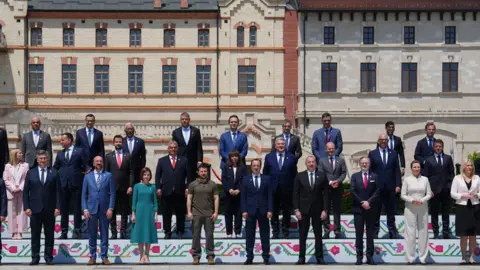Rishi Sunak prioritises illegal migration in European talks
 EPA-EFE/REX/Shutterstock
EPA-EFE/REX/ShutterstockRishi Sunak has said he made cooperation on combating illegal migration a priority at a meeting of European leaders in Moldova.
The prime minister said he was "putting tackling illegal migration top of the international agenda", and the UK was "taking the lead".
The main focus of the European Political Community (EPC) summit was the Ukraine war.
But Mr Sunak was keen to show progress on one of his five domestic promises.
Before he arrived for the talks at a castle near the Moldovan capital, Chisinau, he warned that Europe was "facing unprecedented threats at our border".
The UK is beginning talks with Moldova, which has a population of 2.6 million, on an agreement to return migrants who arrive in the UK illegally.
However, only three Moldovan nationals arrived in the UK on a small boat last year, according to Home Office statistics.
A similar deal struck with Georgia has now come into force.
Around 300 Georgians arrived in the UK on small boats in 2022, and 31 in the first three months of this year.
The EPC - championed by French President Emmanuel Macron - was formed in response to Russia's invasion of Ukraine last year.
It includes 47 European nations - including European Union (EU) member states, the UK, Turkey, Norway and Balkans countries outside the EU.
Ukrainian President Volodymyr Zelensky was also at the summit, which was held less than 15 miles from his country's border.
President Zelenksy, who called for Nato to give a clear commitment that Ukraine could join the Western defensive alliance, had talks with Mr Sunak.
 PA Media
PA MediaSpeaking at the summit, the prime minister agreed that Ukraine's "rightful place" was in Nato, but gave no detail on a path to membership.
He said the UK was working with its allies to ensure Ukraine had the "combat air capability needed to repel ongoing Russian aggression".
The first EPC meeting, in Prague last October, was attended by then-prime minister Liz Truss. The UK is due to host a summit next year.
Tweeting from Moldova, Mr Sunak said: "We've already made migration agreements with Albania, France and the EU to stop the boats.
"This global issue requires collaboration and the UK is taking the lead."
The Times has reported that the UK is keen to increase cooperation with Turkey and Bulgaria as part of efforts to tackle small boats crossing the English Channel.
 PA Media
PA MediaEarlier, Mr Sunak said: "Europe is facing unprecedented threats at our borders. From Putin's utter contempt of other countries' sovereignty to the rise in organised immigration crime across our continent.
"In every meeting, every summit, every international gathering like this, the security of our borders must be top of the agenda.
"The UK will be at the heart of this international effort to stop the boats and defend our national security."
Moldova, which is wedged between the EU and Ukraine, is a former Soviet state, and while its government looks West, pro-Russian separatists control its Transnistria region.
It has accepted thousands of Ukrainian refugees, and the EPC has promised it more support.
In March, Foreign Secretary James Cleverly announced £10m funding for Moldova's energy sector, as well as economic and governance reforms.
Mr Macron has said the new club of nations offers "a platform for political coordination" for countries inside and outside the EU.
But the EPC has no institutions or dedicated staff. That has provoked questions about how any decisions would be implemented.

